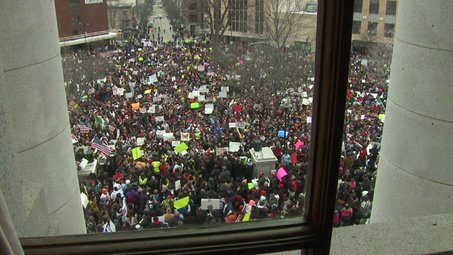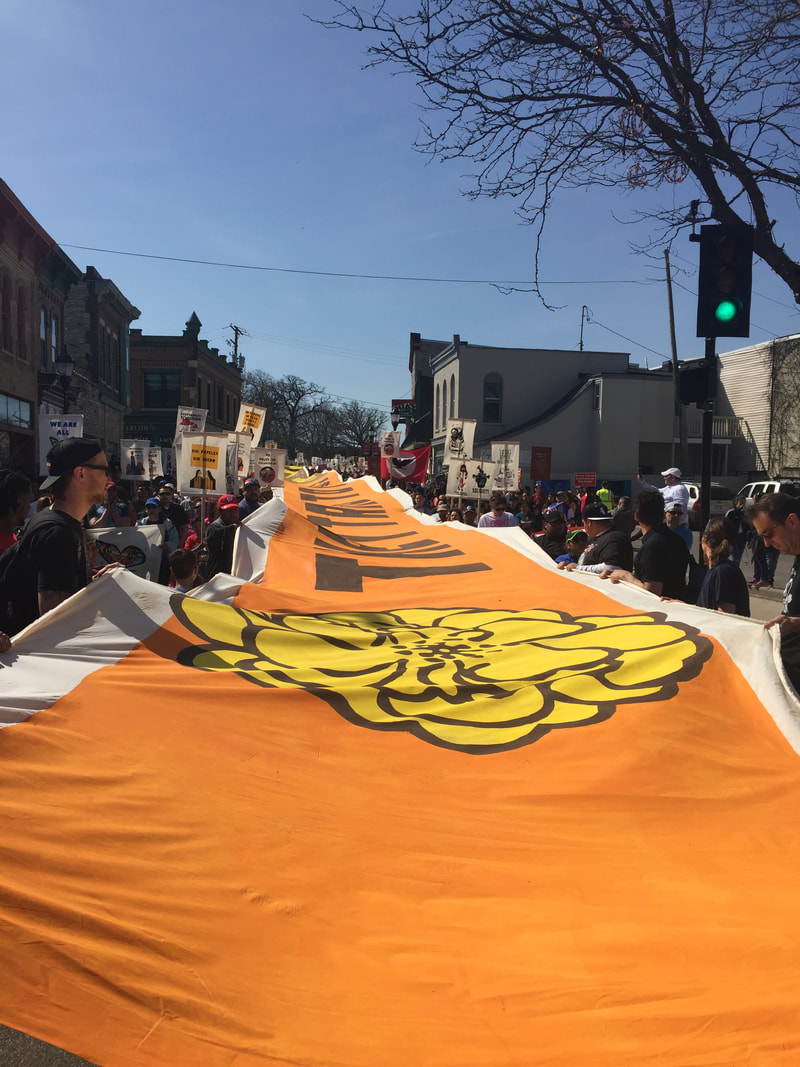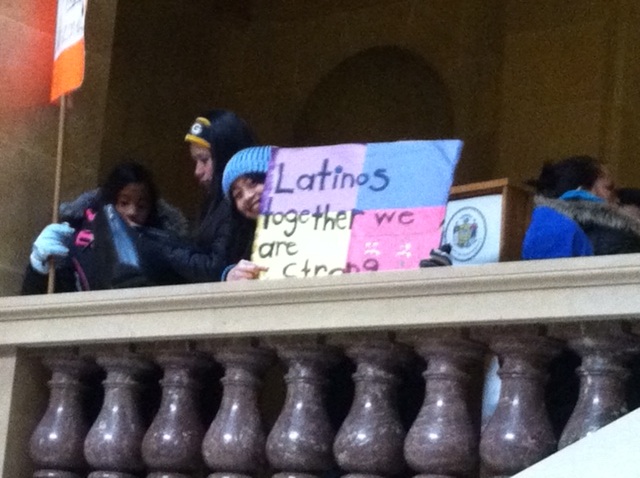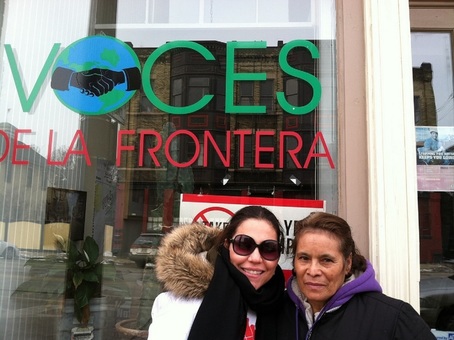A Day Without Latinos and Immigrants 2018
Voces de la Frontera marches in Waukesha on ‘A Day Without Latinxs’
Link to Local News Coverage
Link to Local News Coverage
2016 Event in Madison
"A Day Without Latinos and Immigrants" Draws 40,000 to WI Capitol
Reflections on the Day
by Mark Peters
by Mark Peters
|
When I agreed to go to Madison at the invitation of a staffer from Voces de la Frontera, I only knew that this Milwaukee community organization was sending some folks to oppose two anti-immigrant bills under consideration by Wisconsin’s state legislature. Assembly Bill 723/Senate Bill 533 would prohibit counties and towns from issuing photo identification cards and restrict the uses of photo IDs issued by cities or villages. SB 369/AB 450 , which is aimed at so called “sanctuary cities,” prohibits municipalities from passing laws that prevent local police from inquiring about the immigration status of people they contact and punishes those that do with funding cuts. The Wisconsin Catholic Conference had submitted written testimony against both bills.* Similar laws passed in Arizona have had a negative impact on undocumented immigrants there, and advocates didn’t want to see Wisconsin go the same route.
My first realization that this was something more came as I got within a couple blocks of the Voces office on the near South Side in the heart of Milwaukee’s Latino community. Traffic had come almost to a standstill while police and Voces members diverted traffic away from the street the office was on. When I finally got close enough to explain that I was supposed to be part of Voces’ caravan to Madison, I was quickly waved through. Several large buses were parked outside, and over a hundred people were jammed on the sidewalks and inside the Voces offices. I found my way to a Voces organizer I knew and he asked me to wait until they had everyone loaded on the buses to find out who still needed a ride. At one point it looked like they could fit the last of us in a large van, but in the end there were three of us left, myself and two women, one a senior and the other probably in her 30’s. Guadalupe spoke no English and I no Spanish, but luckily Elvia was able to translate and did just that for most of the four hours we were on the road. I learned a lot about both of them. Guadalupe had been here since 2000 and was now widowed, with six grown children, most of whom were also planning to take part in the day. She works as a cook at McDonalds. Elvia’s husband came here in 1991, and she followed in 1994. She works as a maid at a hotel in Franklin; her husband, I found out nearly at the end of our trip, is a waiter at a restaurant my wife and I go to often. We also knew each other from the local gym. I would never have guessed him to be an “indocumentado,” but then we all probably have met dozens of them in our daily lives without knowing it. Elvia has three children, all of whom went to Catholic schools and the oldest of whom had been able to go to college through the DACA program and now works as a bi-lingual secretary in California. Elvia did a fantastic job of translating for Guadalupe and me, given that neither of us tended to stop after a few sentences to make it easier on her! Both women shared stories of mistreatment on the job and discrimination, and how their supervisors hadn’t wanted to give them off for this day. Both of them, like thousands of others, were risking their jobs in order to make their voices heard. Both have had terrible times trying to get health care, and Guadalupe suffers from serious health problems, but of course must continue to work at a job that would be physically challenging for anyone her age. Elvia told a story about being sent to the DMV for an ID, which was her right, but being told by the Mexican woman at the window, “get out of here, or I’ll call Immigration on you.” After hearing of these type of humiliations and hardships, which they said became really bad only after 9/11, I asked them why they left Mexico and if they were ever tempted to go back. Elvia said it was because, as bad as things are here, they were “a hundred times worse” back in Mexico. Interestingly, she said things only became really bad there about 1994, which just happens to be when, under Bill Clinton, the U.S., Mexico and other Central American countries signed the NAFTA “free trade” agreement (followed later by the FTAA, which expanded NAFTA) that began the process of tanking the Mexican economy while at the same time accelerating the process of decent-paying US jobs being exported to the maquiladoras (sweatshops) on the border. |

When Elvia explained to Guadalupe what we’d been talking about, I didn’t need her to interpret Guadalupe’s response: “Un mil!” A thousand times better here than back home! So it seems that no matter how hard we try to make their lives here, they’re not likely to choose to leave.
Guadalupe reflected on how the south side, where most Latino immigrants live, was once home to European immigrants, and that many of those folks or their descendants now depend on these new immigrants’ rent money. This was just one of many insights she shared. One of the most touching moments of the day for me came when Guadalupe told me through Elvia that she often feels that no one ever listens to her or cares about her, but that I had and it made her feel very welcome and comfortable. When we got into Madison, we started seeing people walking to the capitol building from perhaps two miles away. That’s when I had some inkling of how big this was going to be. Since Guadalupe would have had a hard time walking very far, I dropped them off close to the capitol with my cell phone number so we could meet again later. When I finally found parking and made it back quite a bit later, I was amazed to see a wide circle of marchers surrounding the entire area around the capitol, I would guess anywhere from five to ten thousand people. Some were shouting slogans or just yelling in jubilation, but all were peaceful (as the news coverage confirmed). It seemed to me that the huge majority were families, including many babies in strollers. I felt sorry for those who seemed underdressed for the cold, windy weather but smiles were still the order of the day. I decided to go inside the Capitol to visit my own representatives to tell them why I was against the two bills. Again I was amazed to see thousands more inside, filling the rotunda to the rafters. In my comments to the staffers of my representatives, who are backers of both bills, I asked them to consider the importance of undocumented workers to our state economy (as a Journal Sentinel article the day before had pointed out in regard to dairy farms, 40% of whose employees are undocumented), and stressed that these are not people we have to be afraid of. I mentioned the Catholic Church’s position on immigration and what the Pope was saying down on the border. I was promised that my comments would be passed on, but neither of the staffers tried to engage me in dialogue and their attitude implied that my arguments would make no difference. On the way home, both women were ecstatic with the turnout and energized by the speeches they had heard. They said they had met people there from all corners of Wisconsin, from Kenosha to Green Bay. They wondered, though, if the powerful would listen to all those marching that day. I told them that I would definitely be sharing with the Priests of the Sacred Heart what I saw and heard in the hope that you in turn might help open people’s eyes to their reality. They told me to let them know if I ever wanted them to come and share their stories with you or anyone else. It was an inspiring day, but now that it’s over I wonder how much difference it will make. The ID card bill passed both houses and is now on Governor Walker’s desk. At this writing, the Sanctuary Cities bill was seen as “unlikely” to be taken up by the Senate. If it does not, or if the governor doesn’t sign one or both bills, then the day most certainly had a political impact. But what impact will it have on the hearts of our citizenry? As Donald Trump and others attempt to spread fear and myths, and so many Americans cheer them on, including many Catholics, I fear that demagoguery may still triumph, at least in the short run. If only more people could meet an Elvia or a Guadalupe! Their suffering, strength, courage, and desire to be good neighbors and contribute to their adopted country would melt those hearts and impel us to overcome our fears and reach out in compassion. |


